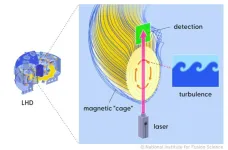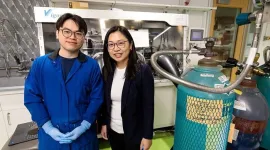(Press-News.org) Health services should teach patients with eating disorders psychosocial skills to help more people recover and avoid relapse, according to an expert.
Anorexia, bulimia and other eating issues affect millions of people, and eating disorder specialist Bethany Crowley warns that eating disorders are often misunderstood. She suggests a more integrated approach to treating people is needed, to focus on the whole person rather than just the disordered eating.
Quieting negative thoughts, learning to cope with emotional triggers and practicing self-compassion are among nine key skills outlined by the therapist in a new book.
An Integrative Approach to Treating Eating Disorders aims to demystify the complexities and nuances of disordered eating. The intention is also to help patients understand their thoughts, feelings, and behaviors.
Warning signs
An estimated 30 million people are affected every year in the US by eating disorders including anorexia, bulimia and binge eating, and every 62 minutes someone dies as a direct result.
The rate of relapse is high among those who seek treatment.
An Integrative Approach to Treating Eating Disorders includes real-life patient case histories to illustrate the struggles people face with disordered eating.
The author says that eating disorders are hard to treat because everything is a metaphor, and one of the key skills to recovery is understanding the meanings behind food and eating. A bag of crisps, she adds, can serve as a symbol of love and a substitute for a hug.
Sensitivity to rejection, obsessive thoughts, and compensatory behavior such as only eating after exercise are among the many warning signs – or red flags – for a possible eating disorder, Crowley warns. Teaching patients to use their authentic ‘voice’ is key to recovery, Crowley suggests, and learning to quiet negative thoughts.
She also says that people with eating disorders often struggle with daily life and relationships such as social situations, and another key skill is understanding attachment styles and needs to develop healthier relationships.
Other skills include people changing the ‘story’ or ‘narrative’ they have been repeating for years. Crowley says some people regard their eating disorder as a ‘best friend’. “What is needed,” she says, “is for them to learn to let go of their rigid thinking and the belief that they cannot change a negative situation, even when opportunities to do so are available.”
Evidence-based treatment
Crowley’s advice is based on multimodal therapy (MMT), an evidence-based therapy which explores biological, psychological, and social aspects of why someone develops an eating disorder. MMT uses several therapeutic techniques at once, instead of one alone which can mean underlying factors are overlooked.
Crowley, who has 20 years’ experience treating eating disorders, says therapists need to develop a better understanding of patients’ struggles from the time they enter treatment to discharge.
For patients, they are given a framework which they can use to cultivate the skills necessary for a positive recovery.
She says: “Psychoeducation is an essential part of my method in treating eating disorders. Helping clients to understand how their thoughts, behaviors, feelings, and perceptions are connected to their eating struggles and body dissatisfaction has been a cornerstone to the effectiveness of my approach.
“For example, people who struggle with eating often have difficulties asking questions when things don’t make sense which can be due to their anxiety or a need for control. If they don’t ask questions, how can they expect to get better?
“It’s our job to help them gain clarity around their issues, so they can eventually ask the right questions – and then better follow and practice the skills needed for eating disorder recovery.”
An Integrative Approach to Treating Eating Disorders also advises that therapists use a physical and emotional energy scale to help patients identify the body’s cues for rest. A lower number means the person is physically and emotionally tired, and should act on this.
Moreover, the book provides details of how patients can identify their emotional triggers – their ‘window of tolerance’ for emotional discomfort. The upper limit is hyperarousal such as agitation and the lower limit is hypo-arousal such as feelings of hopelessness.
END
Psychosocial skills can stop relapse in people with eating disorders, says expert
***UNDER EMBARGO until 10 June 2024 at 00.01am EDT***
2024-06-10
ELSE PRESS RELEASES FROM THIS DATE:
The discovery of new turbulence transition in fusion plasmas
2024-06-10
Background
Fusion energy is that released when two light nuclei combine to form a single heavier one (nuclear fusion reaction). Fusion energy-based power generation (fusion power plant) uses the energy generated when deuterium and tritium combine to form helium. A nuclear fusion reaction does not produce carbon dioxide. In addition, since it is possible to extract deuterium and tritium from the sea water, fusion energy is regarded as a sustainable energy source, and research into its practical application has been progressing rapidly ...
Glowing dye helps surgeons eradicate prostate cancer
2024-06-10
A glowing marker dye that sticks to prostate cancer cells could help surgeons to remove them in real-time, according to a study funded by Cancer Research UK.
Cancer Research UK-funded scientists, based at the Nuffield Department of Surgical Sciences and the Department of Oncology, University of Oxford, Oxford University Hospitals and Oxford NIHR Biomedical Research Centre used a fluorescent dye attached to a special marker molecule to give medics a “second pair of eyes” during surgery for prostate cancer.
Twenty-three men with prostate cancer were injected with the marker dye before undergoing prostate removal surgery. The marker dye found areas of cancerous tissue ...
Study: ALS patients treated by neurologists received better care
2024-06-08
ALS patients received better care if they were treated by a neurologist, a new study published in PLOS One has found.
But researchers found that Black, older and socially disadvantaged ALS patients were less likely to see a neurologist, raising concerns about equity in treating the deadly disease.
Patients who were treated by neurologists were more likely to receive interventions endorsed by the American Academy of Neurology.
“This study highlights the importance of neurologist care for ALS patients and the need to overcome barriers and provide care that is more equitable for ALS patients,” ...
What makes roads safer? New UMD study uses AI to find out
2024-06-07
College Park, Md. – Most people use Google Street View to find their way. Dr. Quynh Nguyen, an epidemiologist and statistician at the University of Maryland School of Public Health, uses it to locate spots where your journey might abruptly end. In a study published June 6 in the British Medical Journal (BMJ) of Injury Prevention, Nguyen identifies uses AI tools to identify key environmental elements impacting car-related collisions as well as cyclist-related and pedestrian-related accidents.
“Car crashes are the leading cause of death for young people ...
Accessibility issues in cancer care
2024-06-07
Researchers at the University of Michigan are finding that many patients may be encountering significant barriers to cancer care, even from their first phone call to a clinic.
Patients attempting to access cancer care must go through several different levels of communication, both before their initial appointment with a physician and throughout their treatment.
Making those first calls to learn more about available cancer care services or to schedule an appointment at a clinic is an important step toward beginning their treatment journey.
“Racial and ethnic disparities have been observed in the outpatient visit rates for ...
Research details method to get efficient, environmentally friendly lithium
2024-06-07
As the electric vehicle market booms, the demand for lithium — the mineral required for lithium-ion batteries — has also soared. Global lithium production has more than tripled in the last decade. But current methods of extracting lithium from rock ores or brines are slow and come with high energy demands and environmental costs. They also require sources of lithium which are incredibly concentrated to begin with and are only found in a few countries.
Now, researchers at the University of Chicago Pritzker School of Molecular Engineering (PME) have optimized a new method for extracting lithium from more dilute — and widespread — sources of the mineral, including seawater, ...
In new experiment, scientists record Earth’s radio waves from the moon
2024-06-07
On Feb. 22, a lunar lander named Odysseus touched down near the Moon’s South Pole and popped out four antennas to record radio waves around the surface—a moment University of Colorado Boulder astrophysicist Jack Burns hails as the “dawn of radio astronomy from the Moon.”
It was a major achievement for the tenacious lander, which was built by the Houston-based company Intuitive Machines and had to overcome a series of technical difficulties to make it to the lunar surface. Burns is co-investigator on the radio experiment that flew aboard Odysseus called Radio wave Observations at the Lunar Surface ...
Restoring our ubiquitination machinery to overcome resistance to cancer therapy
2024-06-07
“[...] the identification of ubiquitin-conjugating enzymes like UBE2J1 and the innovative deployment of PROTAC-type androgen receptor degraders are crucial in combating prostate cancer and overcoming therapeutic resistance.”
BUFFALO, NY- June 7, 2024 – A new editorial paper was published in Oncoscience (Volume 11) on May 6, 2024, entitled, “Restoring our ubiquitination machinery to overcome resistance in cancer therapy.”
In this new editorial, researchers Xiaoling Li and Ping Mu from ...
Sky’s the limit for biofuels
2024-06-07
The United States has enough biomass potential to produce 35 billion gallons per year of aviation biofuel by 2050, a new report confirms.
Oak Ridge National Laboratory’s John Field provided biomass feedstock production expertise to the report focused on the role of the bioeconomy in U.S. decarbonization strategies, which was produced by the Department of Energy’s DECARB program.
The report examined the role of biomass in reducing greenhouse gas emissions across the economy, including opportunities to reach negative emissions. It includes data ...
Nirmatrelvir-ritonavir and symptoms in adults with postacute sequelae of SARS-CoV-2 infection
2024-06-07
About The Study: The results of this randomized clinical trial showed that a 15-day course of nirmatrelvir-ritonavir in a population of patients with postacute sequelae of SARS-CoV-2 infection (PASC) was generally safe but did not demonstrate a significant benefit for improving select PASC symptoms in a mostly vaccinated cohort with protracted symptom duration. Further studies are needed to determine the role of antivirals in the treatment of PASC.
Corresponding Author: To contact the corresponding authors, email Linda N. Geng, M.D., Ph.D. (geng@stanford.edu) and Upinder Singh, M.D. (usingh@stanford.edu).
To ...
LAST 30 PRESS RELEASES:
Maps can encourage home radon testing in the right settings
Exploring the link between hearing loss and cognitive decline
Machine learning tool can predict serious transplant complications months earlier
Prevalence of over-the-counter and prescription medication use in the US
US child mental health care need, unmet needs, and difficulty accessing services
Incidental rotator cuff abnormalities on magnetic resonance imaging
Sensing local fibers in pancreatic tumors, cancer cells ‘choose’ to either grow or tolerate treatment
Barriers to mental health care leave many children behind, new data cautions
Cancer and inflammation: immunologic interplay, translational advances, and clinical strategies
Bioactive polyphenolic compounds and in vitro anti-degenerative property-based pharmacological propensities of some promising germplasms of Amaranthus hypochondriacus L.
AI-powered companionship: PolyU interfaculty scholar harnesses music and empathetic speech in robots to combat loneliness
Antarctica sits above Earth’s strongest “gravity hole.” Now we know how it got that way
Haircare products made with botanicals protects strands, adds shine
Enhanced pulmonary nodule detection and classification using artificial intelligence on LIDC-IDRI data
Using NBA, study finds that pay differences among top performers can erode cooperation
Korea University, Stanford University, and IESGA launch Water Sustainability Index to combat ESG greenwashing
Molecular glue discovery: large scale instead of lucky strike
Insulin resistance predictor highlights cancer connection
Explaining next-generation solar cells
Slippery ions create a smoother path to blue energy
Magnetic resonance imaging opens the door to better treatments for underdiagnosed atypical Parkinsonisms
National poll finds gaps in community preparedness for teen cardiac emergencies
One strategy to block both drug-resistant bacteria and influenza: new broad-spectrum infection prevention approach validated
Survey: 3 in 4 skip physical therapy homework, stunting progress
College students who spend hours on social media are more likely to be lonely – national US study
Evidence behind intermittent fasting for weight loss fails to match hype
How AI tools like DeepSeek are transforming emotional and mental health care of Chinese youth
Study finds link between sugary drinks and anxiety in young people
Scientists show how to predict world’s deadly scorpion hotspots
ASU researchers to lead AAAS panel on water insecurity in the United States
[Press-News.org] Psychosocial skills can stop relapse in people with eating disorders, says expert***UNDER EMBARGO until 10 June 2024 at 00.01am EDT***



